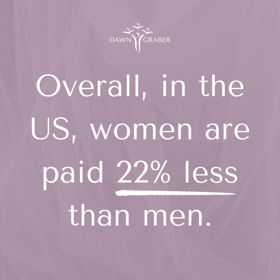Women as self-negotiators. Yeah, we’re doing it.
I often work with women leaders. I've learned a few aspects of negotiation for women that are important considerations for all of us. During the course of my coaching relationships, some women clients have approached me about how to negotiate well and land a new job. In my experience, many women are timid, don't feel worthy, or at least don't want to be a bother when entering negotiations with an employer. Why? They feel the polite response is to be thankful for what's offered. Being appreciative of an opportunity doesn't sound wrong. But such gratitude can quickly quiet the applicant, who may be so grateful for the opportunity that they don't think they should ask for anything that wasn't put on the table initially. They assume the pay will be more than their current job/role, and women I've worked with would be pleased as punch just to land the "position." These reactions fit the long-held belief that women don't ask. In fact, in the 2007 book, Women Don't Ask: The High Cost of Avoiding Negotiation and Positive Strategies for Change by Linda Babcock and Sara Laschever - they found that women would rather go to the dentist than negotiate, but men selected the metaphor of going to a baseball game when considering their part in negotiations.
The gender pay gap is real. Overall, in the US, women are paid 22% less than men. Higher-income roles have closed the gap more, but lower and middle-income women's pay has seen the gap widen even further. From the first offer and especially at that first promotional opportunity - women's advancement opportunities pale compared to men's offers for a similar role. Berkeley Haas Professor Laura Kray and co-authors Kennedy and Lee found that recent MBA grads begin employment earning 88% of their male classmates’ salaries. Ten years after MBA graduation, the same women made 63% of their male classmates' salaries. Economist Claudia Goldin, the October 2023 Nobel Economist prize winner for work on reasons for the gender pay gap, reports on women's negative pay impact after the birth of their first child. Other aspects of bias contribute to the gender pay gap, but for the purpose of this blog, let's examine some possible whys concerning negotiation.
women's pay has seen the gap widen even further. From the first offer and especially at that first promotional opportunity - women's advancement opportunities pale compared to men's offers for a similar role. Berkeley Haas Professor Laura Kray and co-authors Kennedy and Lee found that recent MBA grads begin employment earning 88% of their male classmates’ salaries. Ten years after MBA graduation, the same women made 63% of their male classmates' salaries. Economist Claudia Goldin, the October 2023 Nobel Economist prize winner for work on reasons for the gender pay gap, reports on women's negative pay impact after the birth of their first child. Other aspects of bias contribute to the gender pay gap, but for the purpose of this blog, let's examine some possible whys concerning negotiation.
The default train of thought is that women don't ask for more "like men do," so women are paid less than men. Contrary to this default view, research ever since 2007 has shown that women DO negotiate as readily as men. Why do we keep acting like women aren't entering the necessary back-and-forth of negotiation until both parties are satisfied (and happy, we hope)? We may need to let the facts sink in. Kray found that the MBA women grads whose income was 22% less than their male classmates HAD negotiated even more than men (54% to 44%) but had been turned down more. Missing out on the top jobs initially widened their gender pay gap, especially when measured ten years later (New research shatters outdated pay-gap myth that women don't negotiate).
Since the gender representation gap and gender pay gap for leadership roles continue with primarily men as top-tier leaders, we assume that women must be doing something wrong. And so, the previous experience of women not negotiating continues to be part of our cultural narrative that (like all gender biases) seeps into women's belief systems (and men's, too) and, therefore, affects our actions. It's one more aspect of how we as women need to free ourselves to act more strong and decisive (traditional male leader expectations), asking for what we want and believing we can succeed in a role with responsibilities perhaps we've yet to fully experience (situations in which a man is more likely to portray confidence). Historically, women negotiate for others desiring to spread parity but struggle with negotiating for themselves.
The conversation continues to circulate that women negotiate less readily than men, but Kray says in her work with MBA graduates that we are adding to a gender misperception that WAS true but is NOT currently. Could women like my coaching clients in senior positions - other than MBA-prepared professions - still negotiate less than their male colleagues? Perhaps. But I love that Kray refers to women negotiating less than men as a present-day myth. In fact, Kray believes that perpetuating this myth (at least for MBA graduates) does us all a disservice as we spread and act on the belief that women ask for less and, therefore, women are the problem. What IS true is that women are promoted less than men and make way less money in their working life than men. Suppose Kray's research continues to pan out to be true that all genders are negotiating similarly across multiple disciplines. In that case, it still begs the question of how and for what do women negotiate. Is it solely pay? We know women negotiate more for family care flexibility and benefits like insurance than men, who negotiate more solely for role and pay. Certainly, there is more to negotiating pay in a role to be equitable for all applicants, but how can women best show up in negotiation?
Dr. Deborah Streeter's Rules of Negotiation
Dr. Deborah Streeter was the instructor for the eCornell certification course, "Women in Leadership," which I took and highly recommend. She teaches ten steps for women's effective negotiation. Three highlights pop out to me as I review my notes from her class again. Do your homework, practice, and visualize.
Do your homework
Doing your homework means being prepared. First, zero in on the preferred style of your interviewer and respond appropriately. What is their reputation? How do you relate to their type of personality? Get help from a trusted coach or colleague who can help you adjust your dance (while being fully you) by putting your best foot forward to communicate most easily with the other party to decrease one more potential impediment for this person to understand you. What evidence of mission, vision, and values can you learn and highlight in some of your questions or answers to show you can and want to fit in their culture? What additional stretch goals can you imagine for an organization aligning with its mission, and how can you add a question showing you're already dreaming of what could be? What is this role's salary band at other organizations? How does your cost of living affect a salary in your geographical region? What would your potential employer primarily be seeking in the position you're applying for? Which of your potential asks will be most challenging for the employer to accept? What can you practice as a polite pushback to what may be viewed as a difficulty but instead can be an opportunity? What other questions would be beneficial to work through before you meet with your negotiator? It is often said that most work in salary negotiation is done before an employer and potential employee meet. Make sure to finish the homework of negotiation.
your interviewer and respond appropriately. What is their reputation? How do you relate to their type of personality? Get help from a trusted coach or colleague who can help you adjust your dance (while being fully you) by putting your best foot forward to communicate most easily with the other party to decrease one more potential impediment for this person to understand you. What evidence of mission, vision, and values can you learn and highlight in some of your questions or answers to show you can and want to fit in their culture? What additional stretch goals can you imagine for an organization aligning with its mission, and how can you add a question showing you're already dreaming of what could be? What is this role's salary band at other organizations? How does your cost of living affect a salary in your geographical region? What would your potential employer primarily be seeking in the position you're applying for? Which of your potential asks will be most challenging for the employer to accept? What can you practice as a polite pushback to what may be viewed as a difficulty but instead can be an opportunity? What other questions would be beneficial to work through before you meet with your negotiator? It is often said that most work in salary negotiation is done before an employer and potential employee meet. Make sure to finish the homework of negotiation.
Practice
Practice means preferably working with another trusted person or coach to role play and for your brain to hear your positive and confident responses. You're going for something other than a memorized speech. You will do best when you can adaptively respond to questions as they arise. The more your main points are practiced, the more they'll readily surface when the time is right. Practice rarely makes perfect, but it sure builds confidence and moves the needle towards feeling we've done the best job we can do.
Visualize
Engage in creative visualization, which helps with negotiation on multiple fronts. We continue to learn the brain science of viewing how we want to see ourselves perform and how doing so empowers ourselves to show up with increased confidence for that next step. Another part of creative preparation may include asking for two aspects of what you want in the role. This planning prepares for a win-win scenario if you receive a 'no' in one of your asks. Formulating one's BATNA takes creativity and needs time and attention as part of the preparation aspect of negotiation. BATNA stands for Best Alternative to Negotiated Agreement. Part of being prepared is thinking through what you want if you are told no to your first stretch goal. Again, preparation and practice are the hard work of negotiation.
continue to learn the brain science of viewing how we want to see ourselves perform and how doing so empowers ourselves to show up with increased confidence for that next step. Another part of creative preparation may include asking for two aspects of what you want in the role. This planning prepares for a win-win scenario if you receive a 'no' in one of your asks. Formulating one's BATNA takes creativity and needs time and attention as part of the preparation aspect of negotiation. BATNA stands for Best Alternative to Negotiated Agreement. Part of being prepared is thinking through what you want if you are told no to your first stretch goal. Again, preparation and practice are the hard work of negotiation.
If negotiation isn't currently a women's problem, what must change for the gender pay gap to dissolve and advancement opportunities occur as readily for women as for men? That continues to be the work of implicit bias we must all consider and work towards dismantling in whatever role we currently fill. Suppose current research is pointing towards a wider pay gap in low to middle-income roles and for women after the birth of their first child. In that case, we can be mindful of these situations and advocate for pay equity and transparency.
Women, you are not the problem.
Transforming influence alongside you,

What I’m Reading:
- New research shatters outdated pay-gap myth that women don’t negotiate by Laura Counts, August 22, 2023, in Newsroom at Https://Newsroom.Haas.berkeley.edu
- Now, Women Do Ask: A Call to Update Beliefs about the Gender Pay Gap by Laura Kray, Jessica Kennedy, and Margaret Lee
- Claudia Goldin Wins Nobel in Economics for Studying Women in the Work Force, New York Times, Oct. 9, 2023
- Claudia Goldin’s extensive research on working women as Harvard University’s Henry Lee Professor of Economics

October 12, 2023

Comments